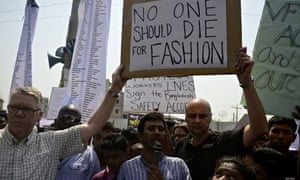Number of clothing factories with union representation has more than
doubled to 237, but is a mere drop in country's 5,000 factories

Fewer than 300 of Bangladesh's 5,000 clothing factories have allowed
in trade unions, as workers' rights remain under pressure a year on from
the Rana Plaza building collapse in which more than 1,100 people were killed.
Amirul Haque Amin, president of the country's National Garment
Workers' Federation, said his union had doubled the number of factories
where it operated during the past 12 months to 42, while the total
number of factories with any union representation had more than doubled
to about 237. However, many workers were still vulnerable to
exploitation despite unprecedented international efforts in the wake of
one of the world's biggest industrial disasters.
"I think it is really hard to say that an ethical factory exists in
Bangladesh at present. As a trade union we cannot say that. We can
simply say that factories are moving towards better conditions," said
Amin, who took part in protests on Oxford Street in London on Thursday to mark the anniversary of the Rana Plaza disaster and put pressure on companies that have yet to pay into a compensation fund for victims.
His comments tally with a report by New York University's Centre for Business and Human Rights which says: "The government of Bangladesh
lacks the resources, administrative capacity, and often the will to
protect workers in garment factories. The labour law remains weak and
enforcement weaker still. Local industry enjoys outsized influence in
the country's politics, which impedes the establishment and enforcement
of rigorous regulation." Authors Sarah Labowitz and Dorothée
Baumann-Pauly say "major corruption challenges" mean that foreign
governments are shying away from providing the finance needed to improve
Bangladesh's infrastructure, such as a weak power network which
exacerbates the risk of factory fires.
Amin said that even with a 77% increase in Bangladesh's minimum wage
last year, workers were struggling to survive on 5,300 taka (£41) a
month, while many factories still required improvements to bring them up
to basic safety standards.
"If multinational brands really want to improve the life of the
workers then they can take the initiative. If representatives of the
buyers, the factories and the workers sit down together they can work
out a better price and some kind of mechanism so workers can get the
benefit," Amin said.
Further evidence has emerged in an Italian documentary of poor
working conditions in Bangladeshi factories. The Presa Diretta programme
filmed factories working for Benetton's Olimpias sourcing division
using young workers and continuing unsafe working practices months after
more than 1,100 workers were killed and 2,000 injured at Rana Plaza.
Benetton is one of a number of retailers linked to Rana Plaza that have
yet to pay into an international compensation fund backed by the UN's
International Labour Organisation.
The
documentary makers filmed locked factory gates at two facilities where
they saw Olimpias branded clothing being made. One factory owner
admitted that employees could start work as young as 13 and the other
said he used workers aged 15 or 16. A production manager for Olimpias
was secretly filmed defending the employment of children in its
factories, saying: "At least they are not on the streets."
The Olimpias representatives admitted that they continued to make
orders despite knowing that few factories in the country had external
fire escapes, seen as a basic safety requirement by most experts. One
said: "None of the buildings here have outside fire exits. It's not my
fault."
Benetton said that comments by its employees and factory owners were
"taken completely out of context and with the objective of constructing a
specifically negative message about us".
Both factories filmed by Presa Diretta were on the list of facilities
supplying retailers that have signed up to a legally-binding factory
safety deal, which included inspections. Benetton had signed up to the
deal and admitted it had added the factories to the list, as it was
legally obliged to do. It also said it had commissioned independent
audits of them.
"We will move to immediately stop working with them if we find that
they are not in compliance with our code of conduct," a spokesman for
the company said.
However, he added that Benetton did not recognise the facilities filmed in the documentary.
















